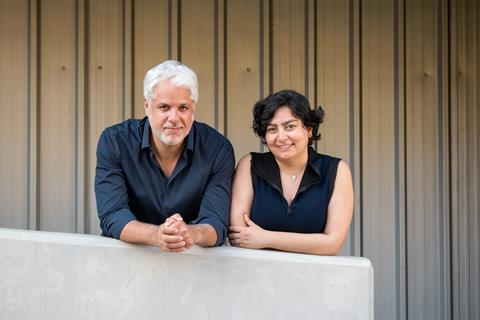
Most conversations in the international film industry touch on the challenges of raising funding for independent movies. In a country such as Lebanon the challenges are particularly acute: the country has experienced one of the worst economic meltdowns in recent history since 2019,
Despite the many obstacles, Beirut-based Abbout Production has managed to do more than keep going and is regularly producing Lebanese and Arab movies that premiere at leading film festivals.

Led by Georges Schoucair and Myriam Sassine, its recent output includes Mounia Akl’s Costa Brava, Lebanon (Venice Horizons), Joana Hadjithomas and Khalil Joreige’s Memory Box (Berlinale competition), Ely Dagher’s The Sea Ahead (Cannes Directors’ Fortnight) and Myriam El Hajj’s Diaries From Lebanon (Berlinale Panorama).
Coming up, Abbout has Cyril Aris’s A Sad and Beautiful World premiering in the Giornate degli Autori section of the Venice Film Festival.
Locarno honour
For nurturing a network of Lebanese and Arab filmmakers amid difficult and often catastrophic circumstances, both Schoucair and Sassine were honoured this month with the Locarno Film Festival’s Raimondo Rezzonico Award.
The festival credited them with fighting to keep indie cinema alive in the region by launching a wide range of Arab and Lebanese feature films internationally. “The films Abbout have produced are a sign of a society that is vital, alive, and continues to look to the future with dogged confidence,” says Locarno artistic director Giona A. Nazzaro.
The company was founded in 1998 by filmmakers Joana Hadjithomas and Khalil Joreige, with Schoucair – an old school friend - joining later to produce their second feature A Perfect Day which played in Locarno in 2005.
Schoucair later took over the company, expanding its output to include other filmmakers working in fiction and documentaries, and was joined by producer Sassine in 2010. The two are based in both Beirut and Paris.
“We really connected,” recalls Sassine, speaking to Screen in Locarno alongside Schoucair. “We had the same ambition to make Lebanese films that can live up to international standards, travel the world and tell authentic stories from our country.”
Industry execs credit Abbout with helping to redefine Lebanese cinema. For their part, Schoucair and Sassine compare themselves to internationally-focused Middle East ‘alter-ego’ producers such as Egypt’s Mohamed Hefzy, Jordan’s Rula Nasser or Tunisia’s Habib Attia.
Over time, the company has grown steadily – it now employs seven people. Sassine estimates it has produced around 30 features in the past 20 years.
“Our ambition grew with each film we made. We started with very small budgets, and little by little the films became more structured – we had better technicians, more skilled directors. As the company grew, the network of filmmakers and professionals around us also grew – we all elevated each other,” says Sassine.
Both identify 2016 as a turning point. Until then, many Abbout-produced films played at smaller film festivals. That year Vatche Boulghourjian’s Tramontane was selected for Cannes’ Critics Week.
“Since then, we’ve had a minimum of one movie per year in an A class festival. And we are from a small country with four million people, no subsidies and no structure for cinema,” notes Schoucair, who is also the founder of Middle East distributor MC Distribution and vice-president of Beruit arthouse cinema Metropolis.
Raising finance
The duo have become adept at raising financing from the international market, travelling to events such as Locarno Pro, Venice Production Bridge, Berlin’s EFM and Cannes to Marche du Film to help patch budgets together from an assortment of public funding, grants, private money and minimum guarantees. They are also canny: Schoucair recalls making a Lebanon set-short film Je Veux Voir, starring Catherine Deneuve, backed by broadcaster France 2, directed by Hadjithomas and Joreige. In the editing room, they realised they had enough material for a feature, which ended up playing in Cannes’ Un Certain Regard.
“We made the movie for $180,000 with Catherine Deneuve and were in official selection at Cannes – competing with big movies with $5-10m budgets,” says Schoucair.
Abbout’s upcoming Venice premiere A Sad And Beautiful World is a more recent case in point. It is also produced by US outfit Diversity Hire, which helped to raise around 30% of the budget from US equity, alongside Reynard Films in Germany, tapping into German funds. The film received production and post-production support from the Marrakech Film Festival’s Ateliers de l’Atlas, as well as the Doha Film Institute, Visons sur Est and Red Sea Film Fund, among others.
This is topped up by pre-sales to the Middle East, where Sunnyland is handling distribution. Schoucair says he’s encouraged by how the Middle East market has developed in recent years, and has emerged as an important source of funding – with Saudi Arabia and streaming platforms helping to drive competition.
“When we produced Tramontane in 2016, it was the first time we pre-sold [to the Middle East],” says Schoucair. “I remember, it was $75,000 they paid to invest in pre-sales on the script for MENA distribution. Now, nine years later, this number is at $200,000-250,000.”
For Abbout, the US has also recently emerged as a new source of financing. Around half of its investors from the country to date are successful members of the Lebanese diaspora while the other half are “purely US guys trusting the US producers who want to invest in independent movies.”
Schoucair cites the example of A Sad And Beautiful World, which he says has six investors from the US putting in around $50,000 each. “They are so happy…for $50,000 they are on a red carpet in Venice…And they like the story, it’s very important that they are proud of the movie. It’s a delightful thing. [For them] it is about more than money.”
“First, you have to convince them that without them, there is no movie. And then they will be proud of the project, and if they end up in Cannes or in Venice, it is enough for them. It is all about the narrative – [as producers] we are telling stories like directors do.”
Adds Sassine: “It’s important for investors to feel connected to the film and to want to tell that story. In that sense, it doesn’t become just about business.”






















No comments yet